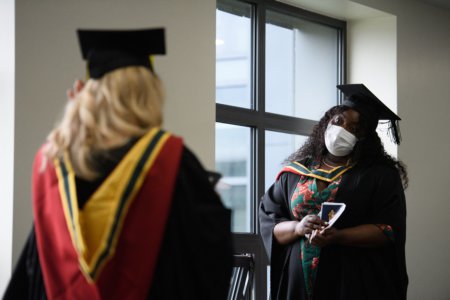
The UK post-study work visa remains an important pull factor for incoming international students. A recent survey suggests that international students would be more likely to consider studying in the UK if they were allowed to stay and work for three years instead of two.
According to The Guardian, a survey of 100,000 international students by the education analysts QS showed that two-thirds would be more likely to consider studying in the UK if the post-study work visa was extended.
The survey suggested fewer than a fifth of students would plan to stay beyond the three years.
Currently, the Graduate visa gives foreign students permission to stay in the UK for at least two years after successfully completing a course in the UK. Students must be in the UK when applying.
Universities UK International director Vivienne Stern was quoted saying by The Guardian that vice-chancellors wanted the government to review whether the two-year visa forms were “a barrier to employing international graduates”, and ensure the UK had a “competitive post-study work offer”.
Former UK home secretary Theresa May had previously revoked the two-year visa to curb immigration.
UK universities, however, warned that removing the post-study work visa in 2012 had harmed international student recruitment. Since its reinstatement, institutions say they have been able to reach a target of recruiting 600,000 international students a year a decade early.
Apart from serving as essential revenue streams for universities, a recent survey estimated international students benefited the UK economy by 26 billion pounds every year.
The report urges the government to review policy and restrictions “to help stimulate further growth in the sector after the pandemic and position post-Brexit Britain as an equally welcoming destination for international students as its key competitors”.
A competitive post-study work visa could entice Indian students to the UK

The number of Indian students choosing to study in the UK plunged after the abolition of the two-year post-study work visa in 2012 and quadrupled when it was reinstated, reported The Guardian. Source: Manpreet Romana/AFP
An extension would be especially appealing to Indian students — 73% said three years would make them a lot more likely to consider the UK.
The number of Indian students choosing to study in the UK plunged after the abolition of the two-year post-study work visa in 2012 and quadrupled when it was reinstated, said the report.
A Home Office spokesperson told The Guardian that post-study work offers across countries were not “directly comparable and we think ours strikes the right balance”.
She said: “Those on the graduate route can stay in the UK and look for work at any skill level for a period of two years, or three years for those with a PhD, and switch into skilled work routes if they find a suitable job.”
Countries with post-study work visas
Numerous countries offer international students post-study work visas to continue living and working in the country.
Australia’s Temporary Graduate visa (subclass 485), for instance, allows international graduates to work for up to four years, depending on their course and level of study.
New Zealand’s post-study work visa would allow international graduates to work for any employer for between one and three years and do almost any work, depending on their qualifications and where they studied.
The UK recently launched the High Potential Individual (HPI) route, which aims to attract high skilled overseas talent who have graduated from some of the world’s top universities.
It allows graduates to come to the UK without a job offer. Individuals can apply for the HPI route if they have graduated from an eligible international university in the five years immediately before their application.










